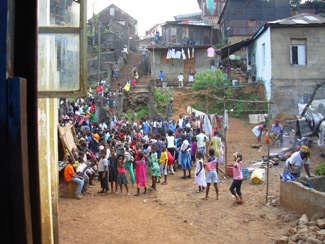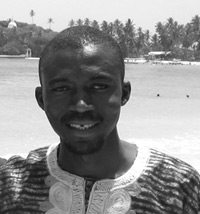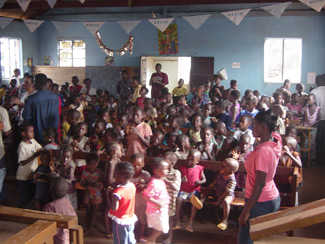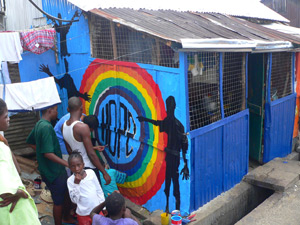|
|
We walked through an open-air market, down a side street in Freetown, the capital of Sierra Leone, West Africa. The vibrant colors and smells of the fruit and vegetables filled our senses. The road was narrow yet full of life. We were surrounded by children laughing and playing all up and down the street. Nearly every vendor greeted us with warm and sincere hospitality.
Before we knew it, the market opened into what appeared to be a valley—more like a crater—on the edge of downtown. Slowly, we walked down a long concrete staircase, into the worst slum I have ever seen. Having traveled in nearly seventy countries throughout Asia, Africa, and South America, I was blown away by the density of poverty and texture of suffering that marked every detail of Kroo Bay.
Kroo Bay is the poorest slum community in the capital city of the world’s poorest country. It’s a former fishing village turned into an informal coastal slum with around six thousand residents—more than four thousand of them children.
Located below sea level, where two of Freetown’s major rivers meet and drain into the Atlantic Ocean, it floods with sewage every time there is major rainfall in the city. This forces residents to spend countless days and nights fighting to save their homes bucket by bucket.
It’s overcrowded, congested, and clogged with trash.
If it weren’t for the laughter of the children and the smiles of the vendors, it would have seemed one of the most hopeless places in the world.![]()
According to one recent article, there is only one toilet in the entire community, forcing half of Kroo Bay’s population to defecate in public. The article goes on to note that one-fourth of Kroo Bay’s children will not live to see their fifth birthday and a tenth of the families in the community have lost a loved one to sickness or disease (typically cholera or malaria) in the past month. Given major technological advances in the twenty-first century, combined with the billions of dollars spent on aid to Africa, it’s hard to believe there is really a place like this on earth.
|
|
My friends and I were visiting the Word Made Flesh community that works in Sierra Leone. We were all going to meet up at Noah’s house.
Noah Tullay runs the Good News Club in Kroo Bay. The Good News Club is a weekly Bible study which includes joyful praise, dynamic Bible stories, heartfelt prayer, compassionate first aid, and nutritious food. Noah grew up in the Kroo Bay community with his father’s two surviving wives. He never knew his own mother. When he was ten years old his dad died. Overcoming obstacles, Noah left Kroo Bay to complete his education. He then returned to the slum that was his childhood home.
His return is a sign of hope, an indictment against the plundered childhood of Kroo Bay’s little boys and girls—reminding them to dream past the clutches of poverty on their own lives. His return stands as a prophetic statement against poverty’s assault on the oppressed humanity of Kroo Bay—a deeply spiritual affirmation that every human being carries the image of God in his or her intrinsic beauty. His return is a tangible sign that the Kingdom of God has arrived in Kroo Bay—inviting us to follow him and our friends who are poor, because God is near.
That afternoon, Noah invited us into his little home in the slum. He has taken in several children, at least one of the boys orphaned during Sierra Leone’s brutal 10-year civil war. We sat in his front room as he offered us cold drinks.
Noah then took us to the bottom of Kroo Bay. The further down the hill we went, the poorer things seemed to get. We eventually arrived at an old, dilapidated church. With several broken windows and a tropical-weather-beaten exterior, I could hardly believe the building could be used. ![]()
|
|
More Than Good News: Affirming God’s Goodness in a Bad World
This church is where Noah conducts the Good News Club. Nearly three hundred children were quickly yet gently ushered into seven rows of old wooden pews. When the pews were filled, kids stood against the walls and in the aisles.
Church was happening in a way I had never seen before. The service opened up with a couple other friends, David and Joseph, leading the few hundred children in song and dance.
We were told that during the civil war, Joseph was conscripted by the rebels and forced to fight. As a child soldier, he was a victim himself. Radiant and beaming with joy, you would never have known that during the war, Joseph had committed unspeakable crimes and perpetrated horrific atrocities. He is one of Kroo Bay’s many reminders of grace; his past is still being redeemed and his life is being restored.
Joseph’s joy and enthusiasm were inspiring. The songs he sang were truly angelic. His praise to God was a prophetic utterance of hope realized.
Joseph, David, and Noah have been joined by a few others who have made substantial sacrifices to serve Christ among the poor. Cami left a strong community and a stable job in southern California (USA). Faye put a high-paced life of influence in Washington, D.C. (USA) behind her. Stephanie grieved the loss of proximity and the embrace of her loving family in a small Midwestern American town. All three obediently and faithfully set out to discover Jesus amidst the suffering of Sierra Leone.
Once the singing concluded, Noah shared a Bible story, a simple reflection on the scriptures, and a challenge to find the goodness of God in a bad world.
After church, the Word Made Flesh staff joined David and Cami in setting up a makeshift first-aid stand. I sat stunned as I watched child after child come forward to have their painful boils or open wounds washed and bandaged. The infections in most of the gaping cuts were gruesome. I was shocked to see how suffering was a commonality shared by every child in that church.
Rarely in my life have I ever been as inspired by a community as I was by those children who gathered to worship in Kroo Bay. Watching Noah lead that congregation of forgotten children in the shell of what was left of that church reminded me of my favorite saint, Francis of Assisi.
|
|
The Imagination of a Modern Saint: Suffering for the Sake of Restoration
I also think about Noah, and sometimes refer to him as “St. Noah of Kroo Bay.” What is it about his life that is so inspiring? How is it that God is using Noah in such compelling ways?
Is it his prayerfulness? A hope against hope, a lament for equality and the affirmation of the dignity of his neighbors?
Is it his commitment to poverty? Noah doesn’t have to live in Kroo Bay, but he does. In fact, he came back to Kroo Bay after escaping its devastating grasp on his life. Even more, Noah has entertained the opportunity to study finance in England, yet remains among his friends—the victims of poverty’s relentless prison of oppression.
Is it his vision and vocation for restoration? Noah believes in the potential of God to change the lives of the children with whom he worships. That is real church. That little, broken-down, poor excuse of a church building at the bottom of the slum is the Church. That is where God is. ![]()
It is in the Good News Club in Kroo Bay where the open wounds of Christ’s body still bleed today. It is the testimony of Noah’s life that tends to these bleeding wounds, ministering to God where the heart of God breaks today.
Reflecting on the lives of Noah and Francis there are a number of marks that make for an effective commitment to establishing hope where there is suffering.
- Building Community. Given an exceptional calling, Francis and Noah threw themselves at the mercy of community. Journeying with a team is not only practically helpful, but theologically central to relevantly expressing the love and presence of Christ among the poor. I have watched Cami’s life and ministry take shape through her service with Noah. It is also Cami’s friendship to Noah that has kept him accountable, supported, and inspired by her own commitment to community.
- Embracing Poverty. Living a lifestyle that reflects respect for friends who are poor and those who suffer pressed Francis and Noah into an embrace of poverty and a celebration of simplicity. The invitation to experience community in Kroo Bay for Cami, Faye, Stephanie, and others is a hinge to the privileged and affluent lives of those of us who come from the West to the lives of those suffering in slums. Noah has created an open door for our community to take part in the life of Kroo Bay’s community by gently challenging us to place ourselves on a process of mapping the incarnation with our own lives.
- Rebuilding the Church. Finding a spirituality that sustains is one thing, but thriving in the faith is a mark that is true of Francis and Noah, and the community that has given itself to the people of Kroo Bay. This spirituality roots itself in a contemplative posture before God, the formation of a serving community expressing itself through worship, a celebration of voluntary poverty as a means of creating freedoms for others, and a new way of being and doing church.
Of course, I don’t want to exaggerate the saintliness of Noah, but I’ve yet to find a man like him anywhere.
Except in history.
And today, in Kroo Bay, history is being made through Noah—a man courageous enough to be the answer to the prayers of a community.





